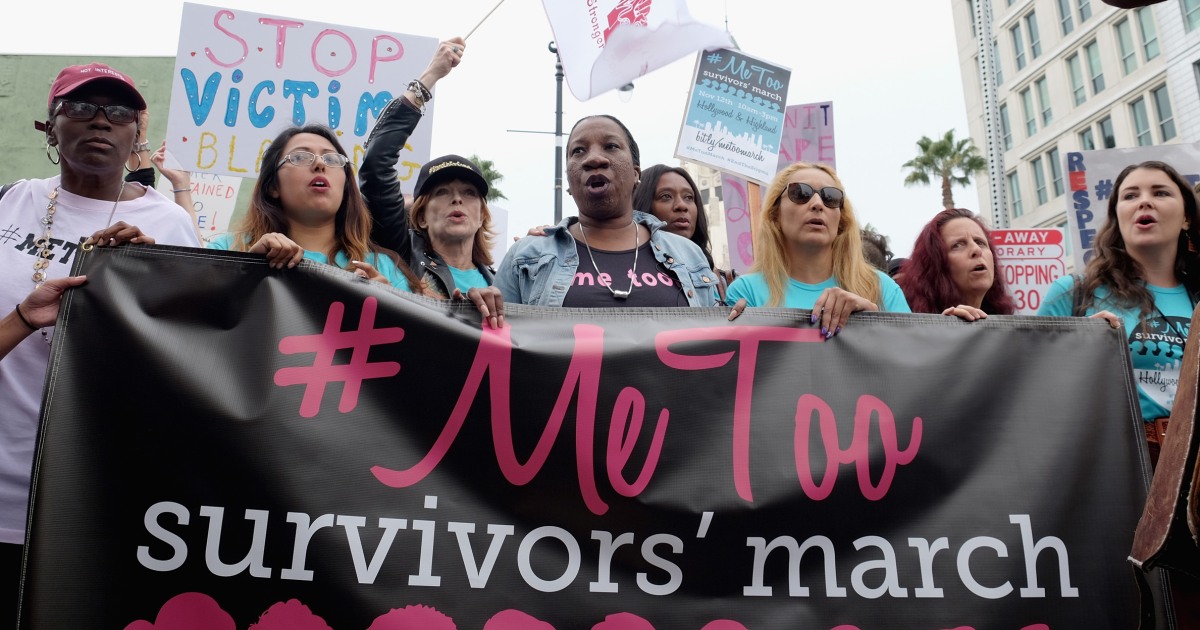
The majority of Americans believe there’s now less tolerance for workplace harassment and abuse and more support for those who report it compared to before the #MeToo movement, according to a new study released by the Pew Research Center ahead of #MeToo’s five-year anniversary this month.
The study, released on Sept. 29, found 70% of Americans say workplace harassers and abusers are more likely to be held accountable today than in 2017, and that 62% believe accusers are more likely to be believed.
These findings include majorities across demographic groups and political parties, as well among people who oppose the #MeToo movement overall, indicating the movement’s wide reach, experts and advocates said.
“We weren’t asking if this impact was necessarily good or bad … [but] we did see Democrats and Republicans, supporters and opponents of the movement all in somewhat agreement here that there has been an impact,” said Anna Brown, a Pew research associate and the study’s author.
Dani Ayers, chief executive officer of the organization me too. International, said the findings serve as “a powerful statement to what public sentiment is currently and what has shifted over the last five years.” (Ayers was not involved in the Pew study.)
The #MeToo movement began in October 2017, when actor Alyssa Milano urged people to share their stories of sexual harassment and assault on social media using the hashtag #MeToo following a New York Times investigation that revealed that movie mogul Harvey Weinstein, who was later convicted of committing sexual acts in the first and third degree, had paid off women who had accused him of sexual harassment for decades. The #MeToo hashtag went viral and sparked an international reckoning around sexual harassment in the workplace.
The movement’s roots were planted more than a decade before the hashtag went viral, when activist Tarana Burke ran a program for Black girls designed to promote healing and community for survivors of sexual assault, basing it on the phrase “me too.’”
Politics matter more than gender
The Pew study found that support for #MeToo is primarily correlated with politics: While nearly half — 49% — of American adults overall who have heard of #MeToo say they support it, compared with 21% who oppose it and 30% who are neutral, the study found that Democrats were about three times more likely than Republicans to support #MeToo, at 70% versus 22%.
The partisan gap is larger than the gender gap: 54% of women who have heard of #MeToo support it, compared with 42% of men.
“We don’t consider this a political issue at all … and yet, like a lot of other issues that are about safety and justice, it is politicized,” Ayers said of those findings.
Age was also a factor in support for the movement: 64% of 18- to 29-year-olds who have heard of #MeToo support it, compared with a minority of support in all older age groups. Those 65 and older had the lowest level of support, at 41%.
“The older generations are more likely to have a certain level of workplace harassment normalized,” said Emily Martin, vice president for workplace justice at the National Women’s Law Center, who was not involved in the Pew study. “There are different expectations depending on when you came into the workplace and the moment in the culture when you developed your expectations about gender and power at work.”
Results show ‘greater understanding’ of harassment
Nearly half of adults — 46% — say it’s very or extremely common for people who experience sexual harassment or assault at work not to report it, with a majority of women and Democrats concurring. A much smaller percentage of respondents — 15% — say false reports of sexual harassment or assault in the workplace are very or extremely common.
Research finds that the majority of sexual assaults go unreported, and that false accusations of sexual assault are rare.
The fact that the Pew findings reflect those realities, Ayers said, shows that “there is a greater understanding” around the prevalence and nuances of sexual harassment and assault today compared with before #MeToo.
But some results also show the limits of that cultural change, Ayers and others said, pointing to the finding that 46% of adults say the increased focus on sexual harassment and assault has made it harder for men to know how to interact with women in the workplace.
That uncertainty, Ayers said, requires education around “what consent looks like” and “what it looks like to interact in a way that is respectful.”
More research needed in #MeToo’s future
Experts and advocates say future research should measure whether more perpetrators of harassment and assault are actually being held responsible and whether survivors feel safer speaking up since #MeToo; the Pew study only measured perceptions of the movement.
“It is helpful to know that people have those perceptions, but it’s also very important to follow that up with research to determine if those perceptions are true,” said Heather Clarke, an associate professor of human resource management at the University of Wisconsin-Green Bay who has researched the impacts of #MeToo in the workplace.
The study incorporated the responses of a nationally representative, randomly selected group of more than 6,000 Americans who responded through online surveys over a 13-day period in July, according to Pew. According to a Pew spokesperson, 65% of respondents had at least some college education, and nearly half of the respondents were classified as middle-income workers, while 29% were lower income and 17% were upper income.
Source: | This article originally belongs to Nbcnews.com









